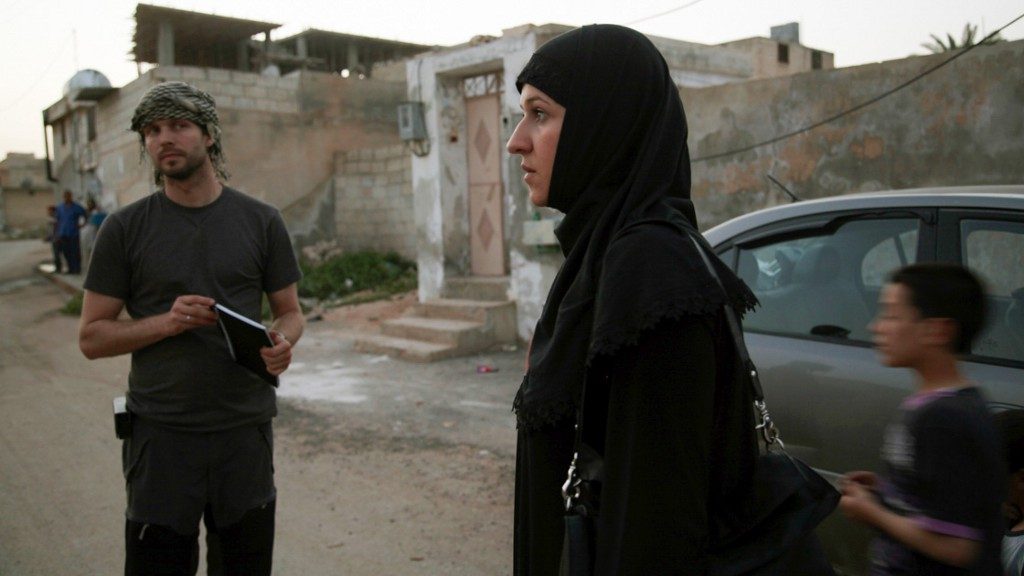Katy Chevigny is an award-winning filmmaker and partner at Big Mouth Productions. She has produced a dozen feature-length documentaries as well as short-form films, videos and webisodes. Her credits include Election Day (2007), which premiered at the South By Southwest (SXSW) Film Festival in 2007 and was broadcast on PBS in 2008. With Kirsten Johnson, she co-directed Deadline, an investigation into Illinois Governor George Ryan’s commutation of death sentences. After premiering at the 2004 Sundance Film Festival, Deadline was broadcast on NBC to an audience of over six million in an unusual acquisition of an independent film by a major network. It was nominated for an Emmy Award and won the Thurgood Marshall Journalism Award, among others. Most recently, she co-directed E-Team with Ross Kauffman, which premiered at Sundance in 2014 and won the Cinematography Award in the U.S. Documentary Competition.
E-Team will play at the Human Rights Watch Film Festival on June 12.
W&H: Please give us your description of the film playing.
KC: Driven by the high-stakes investigative work of four intrepid human-rights workers, E-Team offers a rare look at their lives at home and dramatic work in the field. Using a cinema verite approach, our camera follows the investigators as they piece together the actual events that take place in various troubled spots around the globe.
W&H: What drew you to this story?
KC: Ross and I were drawn to these specific individuals who do this astonishing work of investigating human-rights abuses. Several years ago, we went out to dinner with [our subjects] Anna, Fred, Ole and Peter, and after the dinner, we thought, These guys would make a great movie. They were all charismatic in different ways; they were funny, they were intense, and they were open. You need these kinds of things for a documentary character to hold a viewer’s attention.
W&H: What was the biggest challenge in making the film?
KC: One of the biggest challenges took place in the editing room, where our editor David Teague had to somehow tease a workable story out of over 350 hours of footage. A major creative challenge was figuring out how to balance the work itself, which forms the core story of the movie — i.e., what these guys were doing in Syria, Libya, Kosovo — with getting to know them as people.
W&H: What advice do you have for other female directors?
KC: Don’t let the turkeys get you down! And also, it’s a good time to be a woman director in that there’s a greater awareness that women’s perspectives are needed, and so you can own your own voice as a woman filmmaker in a new way.
W&H: What’s the biggest misconception about you and your work?
KC: People labor under the misapprehension that I choose topics for movies based on issue, which isn’t the case. I am first and foremost trying to make a movie that is interesting to me, and that I think will play like a movie, not like a think-piece or a piece of straight-up advocacy. I am more interested in character and story than in issue. And I am tired of well-meaning messages driving the narratives of films. You have to let the film be its own animal, in my view, for it to hold the test of time. If there are things to be learned in it, so much the better, but that’s not my [reason] in making it.
W&H: Do you have any thoughts on what are the biggest challenges and/or opportunities for the future with the changing distribution mechanisms for films?
KC: This is a tough one; it’s such a wild ride out there right now. We are all looking to each other for answers, because things are changing so fast. The only advice I have is a hard one to follow, and that is: Try not to have the rights to your film tied up for too long, because in many cases your film will have a longer life than your distributor, and you’ll be the one — and maybe the only one — caring about your film five, ten, or fifteen years down the road.
The other thought is to try to take advantage of new distribution opportunities even if they seem risky. Just try to protect yourself by limiting the rights that you’re experimenting with when you choose to work with a new distribution entity.
W&H: Name your favorite woman directed film and why.
KC: I love The Hurt Locker and that Kathryn Bigelow won the Oscar for Best Director. Any criticism you might have of that film, there is no doubt that her directing was masterful. I also love Nicole Holofcener’s work, particularly the latest one, Enough Said, because of the understated and totally believable writing, the humanity in the characters, and her great combination of wit and warmheartedness. I also love Winter’s Bone, which really showcases Debra Granik’s bravery in creating such a compelling story and character out of that dark material. To Granik’s credit, the film is not a grim watching experience because you’re so rooting for Jennifer Lawrence’s character. That’s the real triumph — that film could have just been nihilistic and dark in a trendy film way, but instead it’s got this surprising uplift and heart to it, which adds amazing depth.







